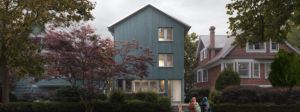
A sample from the standardized design catalogue
BRITISH COLUMBIA – The Province of BC is now offering standardized designs for people building small-scale, multi-unit housing to enable time and cost savings.
Most of the 10 designs are based on “building blocks” that can be mixed and matched, to add features such as a garage or bedrooms, and stacked up to three storeys high. They include concepts for duplex, triplex, quadplex and townhouse designs. Also included are a variety of roof shapes and exterior finishes, so all the designs can blend in seamlessly with existing neighbourhoods, keeping with the intent of small-scale, multi-unit housing to add density. There are also designs for accessory dwelling units, such as laneway homes, and a fully adaptable cottage suitable for aging in place.
There are seven different concepts for small-scale multi-unit housing (SSMUH) and three different concepts for accessory dwelling units (ADU).
Each design complies with the 2024 B.C. Building Code and can be customized for different lot sizes and configurations for use throughout B.C., recognizing that minor amendments may be required to manage specific site conditions. Design files are available for download and have also been compiled into a catalogue for ease of viewing, all at no cost.
See standardized design catalogue here.
The designs were created by a multi-disciplinary team led by Leckie Studio Architecture + Design who created the digital design files and the informational catalogue for subsequent designers to reference and modify.
“Our designs for the Standardized Housing Design Project are intended to be modern interpretations of the local building vernacular across the province. The designs are highly adaptable to a range of site and contextual conditions with multiple options for total floor area, roof form and esthetics. The highly systematic approach to both the design and construction of these small infill housing typologies will complement the streamlined development approval process, providing a co-ordinated effort towards housing attainability in British Columbia,” said Michael Leckie, principal, Leckie Studio Architecture + Design.
Christine Lintott Architects provided additional technical support and feedback during the design phase and BCollective Homes executed construction costing analysis and helped optimize the designs for eventual pre-fabrication.
“We are excited to see this project come together and potentially create future demand for off-site construction. While these homes don’t necessarily need to be built in a facility, the systemized approach aligns well with the potential for prefabrication. The first standard home project will be like every other home but, with repetition, the entire supply chain will become more efficient, leading to reduced costs and faster, more affordable delivery of homes,” said Chris Hill of BCollective Homes.
Carbon Wise Consulting carried out the energy modelling and created templated energy modelling files and compliance checklists to give subsequent energy modellers a head start to ensure the designs meet Energy Step 4 in Climate Zone 5, making them viable in the communities in which most British Columbians live.
Wiser Projects led early consultation and designed the project requirements to meet feedback from local governments and the construction sector.
Business Examiner Staff

